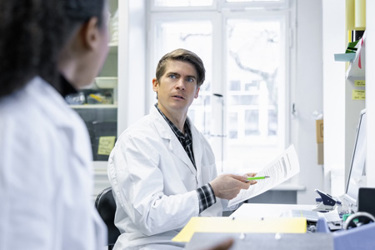Questions You And Your New CDMO Might Be Asking
A conversation with Seth Levy, Modalis Therapeutics

No business relationship in pharma can be more consequential than what an innovator has with its CDMO.
Seth Levy, Ph.D., a senior director at Modalis Therapeutics, has been on both sides of the outsourcing contract — he’s managed outsourcing relationships on behalf of CDMOs and sponsors. Given his unique perspective, we wanted to know what he thought about the most critical parts of establishing that relationship, including the key questions to ask as they’re getting acquainted.
Here’s what he told us.
Questions You Might Have For Your New CDMO
What are you looking for in a CDMO as a small gene therapy company?
Besides the obvious price, timeline, and technical capabilities of the CDMOs you are considering, the business maturity of the CDMO and its competency with your drug class are incredibly important. Questions to ask include:
- Was this CDMO recently acquired?
- Is it a new CDMO?
- Is it a new site for the CDMO?
- How experienced are the employees?
- Is it an existing CDMO looking to get into a new modality?
- Has the CDMO been audited by any regulatory bodies?
- Does the CDMO have its own manufacturing platform?
All those facets take time, often years, for CDMOs to develop and manage smoothly. In the context of this article, if you are a small gene therapy company, you will need to assess these elements for yourself and decide which risks are worth taking and which are not. Are financial savings worth the potential risk of a challenging outsource environment? Is the cost of a more established (not necessarily larger) CDMO worth it for a potentially more reliable timeline? If you are tech transferring a process established in-house, then understanding their acceptance of different technical or operational parameters may be key to a successful partnership.
How closely should we be scrutinizing their equipment trains? What are some key areas where differences matter?
From the technical perspective, once you move past the initial evaluation phase of potential partners, it is critical to understand facility fit, i.e., their equipment, when transferring your process.
You may have to remind the CDMO (and yourself!) that no one knows as much about your product and process as you do. If there is a process parameter, a stability issue, or a key reagent that is critical for your product quality then that is something you need to drive home or have risk mitigations in place if the CDMO cannot meet those demands.
The CDMO may have the same equipment in name, but models can vary greatly, especially newer models compared to older models. Something as trivial as which version of software a CDMO uses can be a snag. We have seen that when trying to transfer methods from our equipment to a partner who had the same make and model of a piece of equipment but had not upgraded their equipment in the GMP space to the most recent version of software because of legacy processes.
How do we agree on viral safety testing strategies? What if we disagree with their choice of CRO or any other contractor for that matter?
No CDMO will perform every test you need for product release, so outsourced testing is inevitable. During the evaluation phase, ask the CDMO the following questions to determine how flexible they can be to meet your needs.
- Which vendors do they use?
- How do they qualify those vendors?
- Can you choose the vendors?
- Can you communicate directly with the contract testing labs?
- How does the CDMO present testing options to you?
While reviewing proposals with the CDMO, it is essential to talk to the technical staff to align on the testing strategy for any lots that will be produced. It is also important when aligning on your quality agreement that you understand how your CDMO qualifies and audits any potential vendors.
What should we do if our new CDMO’s segregation and containment infrastructure and procedures don’t match ours?
To truly understand the CDMO’s infrastructure the best thing you can do is take a tour of the facility. If you can travel and spend the day seeing the site and meeting the team that will give you the best perspective of how the CDMO truly operates.
A video of the facility is not the same as a representative walking the floors and answering questions in real time as you see the layout, equipment, and people at work, but if you cannot travel to the CDMO, then a virtual tour of the facility would be the next best thing.
Questions Your New CDMO Might Be Asking
What scale-up challenges are clients often unprepared for when moving to a CDMO?
Most innovator companies looking to outsource do not have the ability to scale their process; therefore, they may lack some of the operational insights. Adding transfection cocktail to a 500-L bioreactor is very different than adding it to a 10-L bioreactor. Data on filtration and column sizing may be lacking as well. And oftentimes, innovator companies have no processes for drug product manufacturing and the knowledge ends at drug substance.
What red flags should I watch out for that signal my new client isn't ready for a tech transfer?
One of the biggest challenges from a potential sponsor is the desire to co-develop while tech transferring a process. As in, the sponsor has not concluded development yet or plans to transfer one part of the process while they continue to work on the next step in the process.
The delays to the timeline if the sponsor is not “right first time” can be very challenging for a CDMO that is booking out months in advance for multiple clients and programs.
How should we position criticism and constructive feedback, like when we observe ways to improve efficiency or compliance?
This is more personal than technical. Understanding your client as a person or group of people is paramount for improving the process while not putting a strain on the relationship. Some key questions to ask are:
- Is your client aware their process has any potential flaws?
- Does your client demand that you perform their process identically even if facility fit is a challenge?
- Does your client expect the process to behave a certain way, even in the absence of data?
Knowing what makes your client tick and how open-minded they are during your tech transfer process will guide the delivery of your feedback.
Closing Thoughts
Regardless of which side of the table you are sitting on, the end goal should be partnership. From the sponsor side you want to work with a CDMO that is flexible, understanding, and willing to accommodate anything that makes your process or product unique. From the CDMO side you want a sponsor that is self-aware and knows what is important for their process and product, and what is not. Ownership of the process and product from both parties is key to an effective collaboration.
About The Expert:
 Seth Levy is a senior director of process development at Modalis Therapeutics. His experience spans both sides of the outsourcing agreement. He has led teams in MSAT development for the manufacture of viral vectors at a CDMO and for sponsor companies. He received his Ph.D. in molecular and cellular pathology from the University of Alabama at Birmingham.
Seth Levy is a senior director of process development at Modalis Therapeutics. His experience spans both sides of the outsourcing agreement. He has led teams in MSAT development for the manufacture of viral vectors at a CDMO and for sponsor companies. He received his Ph.D. in molecular and cellular pathology from the University of Alabama at Birmingham.
